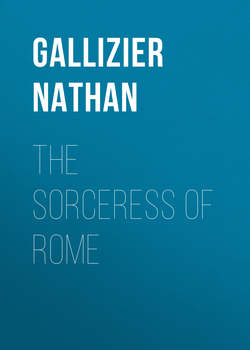Читать книгу The Sorceress of Rome - Gallizier Nathan - Страница 2
INTRODUCTION
ОглавлениеThe darkness of the tenth century is dissipated by no contemporary historian. Monkish chronicles alone shed a faint light over the discordant chaos of the Italian world. Rome was no longer the capital of the earth. The seat of empire had shifted from the banks of the Tiber to the shores of the Bosporus, and the seven hilled city of Constantine had assumed the imperial purple of the ancient capital of the Cæsars.
Centuries of struggles with the hosts of foreign invaders had in time lowered the state of civilization to such a degree, that in point of literature and art the Rome of the tenth century could not boast of a single name worthy of being transmitted to posterity. Even the memory of the men whose achievements in the days of its glory constituted the pride and boast of the Roman world, had become almost extinct. A great lethargy benumbed the Italian mind, engendered by the reaction from the incessant feuds and broils among the petty tyrants and oppressors of the country.
Together with the rest of the disintegrated states of Italy, united by no common bond, Rome had become the prey of the most terrible disorders. Papacy had fallen into all manner of corruption. Its former halo and prestige had departed. The chair of St. Peter was sought for by bribery and controlling influence, often by violence and assassination, and the city was oppressed by factions and awed into submission by foreign adventurers in command of bands collected from the outcasts of all nations.
From the day of Christmas in the year 800, when at the hands of Pope Leo III, Charlemagne received the imperial crown of the West, the German Kings dated their right as rulers of Rome and the Roman world, a right, feebly and ineffectually contested by the emperors of the East. It was the dream of every German King immediately upon his election to cross the Alps to receive at the hand of the Pope the crown of a country which resisted and resented and never formally recognized a superiority forced upon it. Thus from time to time we find Rome alternately in revolt against German rule, punished, subdued and again imploring the aid of the detested foreigners against the misrule of her own princes, to settle the disputes arising from pontifical elections, or as protection against foreign invaders and the violence of contending factions.
Plunged in an abyss from which she saw no other means of extricating herself, harassed by the Hungarians in Lombardy and the Saracens in Calabria, Italy had, in the year 961, called on Otto the Great, King of Germany, for assistance. Little opposition was made to this powerful monarch. Berengar II, the reigning sovereign of Italy, submitted and agreed to hold his kingdom of him as a fief. Otto thereupon returned to Germany, but new disturbances arising, he crossed the Alps a second time, deposed Berengar and received at the hands of Pope John XII the imperial dignity nearly suspended for forty years.
Every ancient prejudice, every recollection whether of Augustus or Charlemagne, had led the Romans to annex the notion of sovereignty to the name of Roman emperor, nor were Otto and his two immediate descendants inclined to waive these supposed prerogatives, which they were well able to enforce. But no sooner had they returned to Germany than the old habit of revolt seized the Italians, and especially the Romans who were ill disposed to resume habits of obedience even to the sovereign whose aid they had implored and received. The flames of rebellion swept again over the seven hilled city during the rule of Otto II, whose aid the Romans had invoked against the invading hordes of Islam, and the same republican spirit broke out during the brief, but fantastic reign of his son, the third Otto, directing itself in the latter instance chiefly against the person of the youthful pontiff, Bruno of Carinthia, the friend of the King, whose purity stands out in marked contrast against the depravity of the monsters, who, to the number of ten, had during the past five decades defiled the throne of the Apostle. Gregory V is said to have been assassinated during Otto's absence from Rome.
The third rebellion of Johannes Crescentius, Senator of Rome, enacted after the death of the pontiff and the election of Sylvester II, forms but the prelude to the great drama whose final curtain was to fall upon the doom of the third Otto, of whose love for Stephania, the beautiful wife of Crescentius, innumerable legends are told in the old monkish chronicles and whose tragic death caused a lament to go throughout the world of the Millennium.
